How in-womb blood transfusions helped save Leo’s life
LITTLE Leo Eleftheriou hadn’t even been born when he received the first of three blood transfusions that helped save his life after developing a haemorrhage in mum Anastasia’s womb.
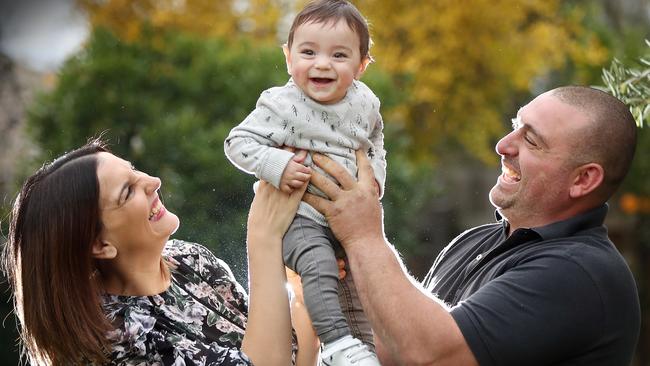
VIC News
Don't miss out on the headlines from VIC News. Followed categories will be added to My News.
A SERIES of radical blood transfusions fixed a life-threatening bleed just weeks before a baby’s birth.
Anastasia Eleftheriou was on the home straight of her second pregnancy when a routine scan at 32 weeks revealed fluid was building up around baby Leo’s vital organs.
The Mercy Hospital for Women’s Perinatal Medicine Clinic then began urgent detective work to find the cause of the fluid around Leo’s heart, lungs and stomach in a bid to save his life.
Results from a special blood test, a Kleihauer test, gave the first lead that there was possibly bleeding across the placenta. A rare, but plausible cause for anaemia.
The only way they could know for sure, was to take a blood sample from Leo himself.
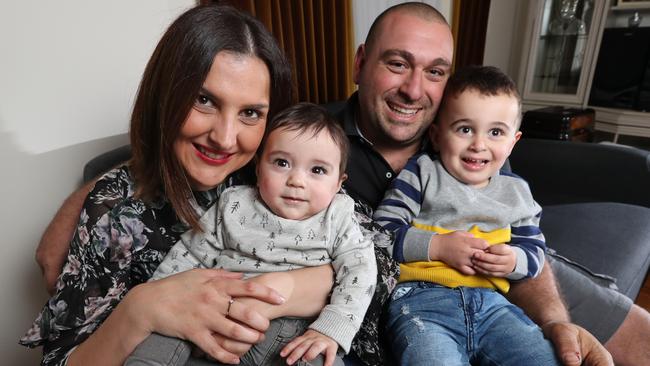
Under ultrasound guidance, they placed a needle inside the umbilical vein in his liver to remove just 0.2ml of blood. His haemoglobin count should have been 160 at this time of pregnancy. Leo’s was 45.
“It was critically low, life-threatening, really,” Prof Sue Walker said. “Babies’ blood counts can drop quite low without going into heart failure. But when your heart is getting too little oxygen to be able to pump effectively, then that’s an end-stage situation.”
This procedure confirmed a foetal-maternal haemorrhage was occurring, a rare and dangerous bleed from the baby’s circulation into the mother across the placenta.
Leo’s only chance was a foetal blood transfusion.
It is a procedure Mercy specialists perform twice a month, but usually the one treatment is a complete fix. Not for Leo.
“This was quite an exceptional case,” Prof Walker said. “Fortunately, it is rare.”
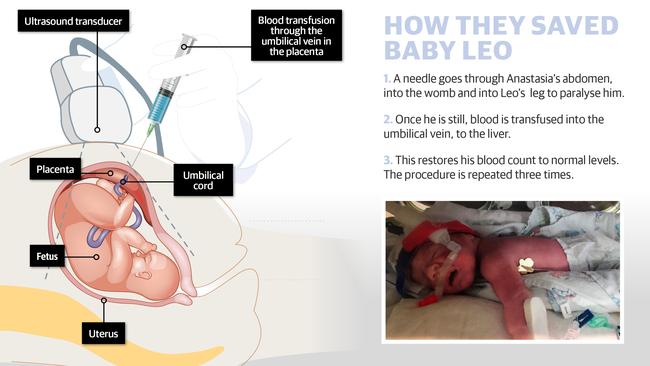
First a needle went through Ms Eleftheriou’s abdomen, into the womb and into Leo’s leg to sedate him.
Once he was paralysed, blood from donated Red Cross blood stores was delivered into the umbilical vein into his liver. It was just enough to make his critically-ill heart pump a bit stronger, but not to overwhelm it.
“We had to wait until he woke up and his heart rate was going. If that didn’t happen, I’d need an emergency caesarean straight away,” Ms Eleftheriou said.
“We were just watching the scan and the heart rate; trying to figure out whether there was movement in my belly. It would take a good hour or two. He’d take his time to wake up. It was incredibly traumatic.”
Two days later, the procedure was repeated, taking Leo’s blood count after the first transfusion of 90 to the full 145 healthy mark.
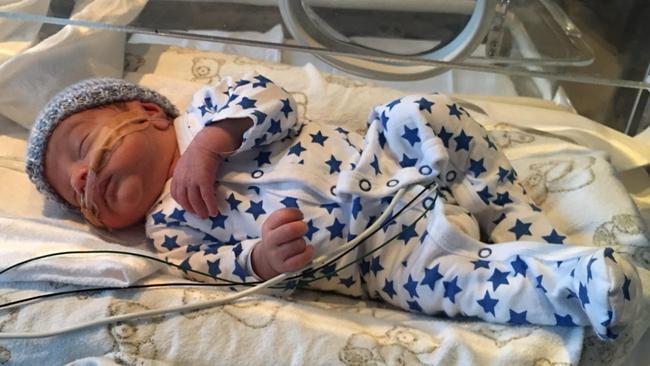
That should have been a complete fix for Leo. He initially responded well. Ms Eleftheriou felt him kick and move again, and the scans three times a day showed him to be stable.
But three days in, she could no longer feel him move as often. It was clear the bleeding was continuing.
Prof Walker decided to do one final transfusion to get Leo’s heart in the best possible health, so he could be delivered the next day.
“We’d given him enough blood that his heart was in a good state. We felt this was a very unstable situation. It’s hard to know when he’ll have a massive bleed and we might lose him,” Prof Walker said.
Leo arrived on September 17, at 33 weeks and six days.
“It was a relief to finally have him, but it wasn’t easy,” Ms Eleftheriou said.
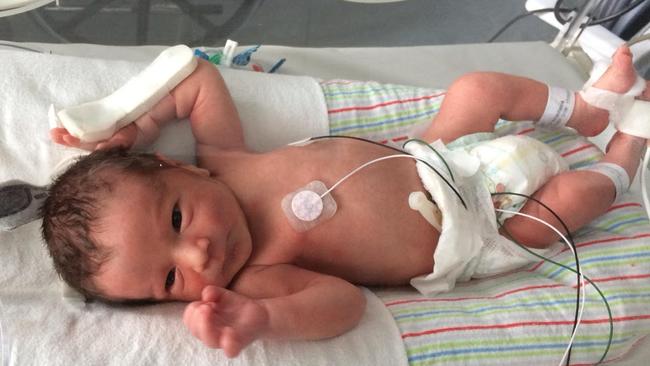
“We had no idea if he was going to come out OK or even survive. They didn’t know how long he’d been so severely anaemic.”
During his stint in intensive care and a month in the special care nursery, Leo passed every hurdle.
“My husband and I say to him every day: ‘We’ve got a story to tell you when you grow up’,” she said.
“We are so indebted to the Mercy. They saved our baby’s life.”
Now, with a healthy eight-month-old boy in their arms, the couple shared their survival story last night at the Mercy Health Foundation ball.
The event raised funds for the newly formed Mercy Perinatal, which supports research and care into the most complicated and vulnerable pregnancies.
To support this research, go to mercyperinatal.com


